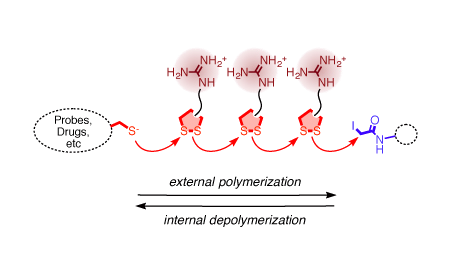- Bang, E.-K.; Gasparini, G.; Molinard, G.; Roux, A.; Sakai, N.; Matile, S. “Substrate-Initiated Synthesis of Cell-Penetrating Poly(disulfide)s” J. Am. Chem. Soc. 2013, 135, 2088-2091

Lessons from surface-initiated polymerization are applied to grow cell-penetrating poly(disulfide)s directly on substrates of free choice. Reductive depolymerization after cellular uptake should then release the native substrates and minimize toxicity. In the presence of thiolated substrates, propagators containing a strained disulfide from asparagusic or, preferably, lipoic acid and a guanidinium cation polymerize into poly(disulfide)s in less than 5 min at room temperature at pH 7. Substrate-initiated polymerization of cationic poly(disulfide)s and their depolymerization with dithiothreitol causes the appearance and disappearance of transport activity in fluorogenic vesicles. The same process is further characterized by gel-permeation chromatography and fluorescence resonance energy transfer.
DOI: 10.1021/ja311961k
open archive unige:26439 • pdf ![]()
